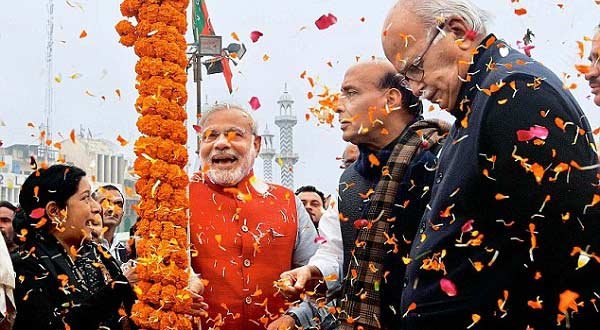
AMULYA GANGULI
[dropcap]S[/dropcap]ince communication skills are essential for political success, it is not surprising that the Bharatiya Janata Party’s voluble prime ministerial candidate, Narendra Modi, is edging ahead of the far more subdued Rahul Gandhi, the Congress’s frontline campaigner for the forthcoming general elections.
It is worth noting that both of them entered the field carrying burdensome baggage. In Modi’s case, it is his suspected complicity in the Gujarat riots of 2002 while Gandhi is weighed down not by any lapses of his own, but the taint of scams, ineptness and cynicism associated with the Manmohan Singh government.
Yet, if Modi is forging ahead, it is because of two reasons. One is his no-nonsense persona and the other is his focus on development. Both of these have an appeal for the audiences, mainly youth.
While the confidence that he exudes adds to his appeal as a “strong” leader, the emphasis on growth shows that he is his own man who is not overly bothered about the pseudo- religious pro-Hindutva predilections of the Rashtriya Swayamsevak Sangh (RSS), the BJP’s ideological guru.
However, even if the RSS is conspicuously silent, the so-called Internet Hindus are carrying on their venomous communal propaganda with considerable zeal. To quote from one of their messages circulating in cyberspace, the extremist Hindus are waiting for “Shri Modi to take our ‘Hind’ away from the feet of Italy and Islam”.
With friends such as these, who needs enemies? It cannot be gainsaid that if they become more vocal, then they can trip up Modi, for their crude sectarianism will stoke the longstanding fears among the Muslims about the Sangh parivar’s agenda of establishing a Hindu rashtra.
It is understandable, therefore, that BJP president Rajnath Singh has sought to assure the Muslims that if his party has committed any mistakes, he will apologize. Is this an attempt to atone for the transgressions of 2002?
If so, it may not be very reassuring because, first, Modi himself is still declining to apologize. And, secondly, there is an “if” in Rajnath Singh’s comment suggesting that the saffron brotherhood is unwilling to confirm or deny its behind-the-scene role during the outbreak, which made Atal Behari Vajpayee admit that a section of the BJP was swayed by communal sentiments (bhavnao se parichalit thhey) as the recent incarceration of a former BJP minister, Maya Kodnani, and others for rioting has shown.
As for Modi, although he hasn’t cared to say “sorry”, he has at least kept away from any expressions of overt communalism. He knows that he has the chance of a lifetime which he cannot have dreamt of earlier. So, he is careful enough not to ruin it by following the parivar’s standard anti-minority line.
In contrast to Modi’s planned assault on the government, Gandhi is still feeling his way through. He may have overcome some of his earlier diffidence, but he is yet to come through as a clear-sighted leader with an agenda for the country which will have an immediate appeal.
Instead, his emphasis on remoulding the Congress can give the impression that he has already given up any hope of success this year but is preparing for the long haul. Moreover, he is persisting with his party’s socialistic line of sops, subsidies and quotas that have diminishing appeal in a liberalized age.
However, Modi’s present advantage may have been a paying proposition in a presidential contest. But the imperatives of a parliamentary poll are different, especially in a country as large and variegated as India, where not only are the regional parties dominant players in some states but the BJP and the Congress do not even have much of a presence in them.
The BJP is banking, therefore, on Modi’s appeal enabling it to win about 200 seats in the 545-member Lok Sabha (two members are nominated), which will make it easier for it to lure some of the regional parties to its side.
But the fact that so far only the Telugu Desam, the Lok Janshakti Party (LJP) and a few minor Tamil Nadu parties have decided to go along with it – apart, of course, from old allies like the Akali Dal and the Shiv Sena &ndash – is an indication that Modi is not as much of an ace in the pack as the BJP believes.
Interestingly, the earlier assumptions about Tamil Nadu Chief Minister Jayalalitha teaming up with the BJP have been nullified by her party’s announcement that she will be the Third Front’s prime ministerial candidate.
The expectation in the Third Front, currently comprising 11 regional parties, is that if it can win, say, 220/230 seats, it may be able to form a government with outside support, probably of the Congress, as between 1996 and 1998.
But there’s many a slip between the cup and the lip. The Third Front’s difficulty is that it has other wannabe PMs in the wings other than Jayalalitha such as the Samajwadi Party’s Mulayam Singh Yadav, although his current unpopularity among Muslims because of the Muzaffarnagar riots is a hindrance. It is still not easy, therefore, to predict a sure winner.
(01-03-2014-Amulya Ganguli is a political analyst. The views expressed are personal. He can be reached at [email protected])

